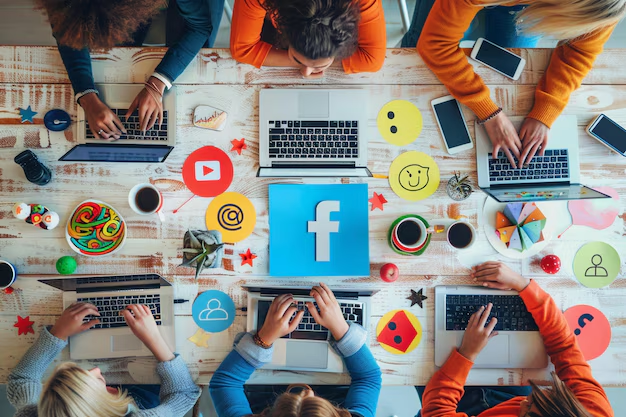The Future of Social Media: What Platforms Will Look Like in 2025
Introduction
Since the early days of social media, when users could only share photos and status updates, the platform has advanced significantly. The ways we connect, communicate, and share online are evolving along with technology. Social media platforms are changing in fascinating ways to meet user expectations and technological advancements as 2025 approaches. Here is a glance at what social media will look like in the future.
The Influence of AI on Social Media Platforms
Artificial intelligence is becoming a significant factor influencing social media as it advances in sophistication. AI will be crucial to user experience personalization by 2025. Imagine accessing a platform where, thanks to AI algorithms that know you better than ever, the feed is tailored to your interests, pastimes, and browsing history. Additionally, AI will play a key role in content selection and recommendations, assisting users in finding information that speaks to their particular interests.

Augmented and Virtual Reality (AR/VR) Integration
By 2025, augmented reality (AR) and virtual reality (VR) will be effortlessly incorporated into social media, revolutionizing the way we interact with digital content. Consider VR environments where users can interact digitally, attending events or discovering new worlds with others, or immersive AR filters that enhance video chats. Social media will feel more intimate and immersive as a result of these technologies, which will reshape the rules of social interaction.
The Rise of Decentralized Social Networks
Concerns about platform monopolies and data privacy are leading to the emergence of decentralized networks, which are frequently based on blockchain technology. Decentralized platforms, as opposed to traditional social networks, provide users more freedom over their data and less dependence on a single business to host and oversee all interactions. These platforms will probably gain traction by 2025 as consumers look for substitutes that put privacy, freedom, and openness first.
Privacy and Data Security: A New Priority
In the world of social media, data security is becoming more and more important. Users will have more influence over how their data is used thanks to laws like the CCPA and GDPR that are pushing for improved data privacy. More privacy-focused features, like more robust encryption and adaptable data-sharing options, will be available in 2025, enabling users to share content with confidence.
The Shift Towards Short-form and Snackable Content
Social media companies are reacting to the fact that people’s attention spans are getting shorter by prioritizing short-form content. Short, interesting videos may efficiently grab attention, as seen by platforms like TikTok, and this trend is only expected to increase. More platforms will likely concentrate on snackable content, which is meant to capture viewers’ interest and have an impact in a matter of seconds.
The Evolution of Influencer Marketing
Because followers want authenticity, influencer marketing is changing. Influencers will collaborate with brands in more significant ways in 2025, emphasizing sincere suggestions and relatable, real content. With influencers only endorsing goods they truly believe in, this change will increase transparency in influencer marketing and build audience trust.

Niche and Interest-based Social Platforms
Interest-based platforms that target particular communities are becoming more prevalent as social media develops. Platforms that cater to particular interests, passions, or occupations will grow in popularity as they provide users a more customized experience. Niche communities will give users a place to interact with people who have similar interests by 2025, enhancing the genuineness and satisfaction of online interactions.
The Role of User-generated Content (UGC) in 2025
Although it will remain a mainstay of social media, user-generated content will play a bigger role in the identities of the platforms. Influencers and brands alike understand that user-generated content (UGC) provides an authenticity that appeals to viewers. Platforms will probably provide UGC more incentives and visibility by showcasing authentic voices and experiences, which increases user relatability and trust.
Sustainability and Ethical Practices in Social Media
Many people now prioritize sustainability, and social media companies are paying attention. By 2025, platforms will have integrated sustainable and ethical principles into their operations, from encouraging eco-friendly content to reducing energy usage. In order to encourage users to maintain a good balance between their online and offline lives, social media businesses are probably going to put in more effort to address concerns like digital wellbeing.
AI-powered Moderation and Safer Spaces
Maintaining user safety on social media platforms is one of the problems it confronts, and AI-powered moderation will play a key role in solving this problem. AI will improve the detection of dangerous conduct, unsuitable content, and bullying, creating safer online environments. Because of this, social media in 2025 will offer more polite and inclusive settings that make users feel safe and at ease.
Social Commerce Evolution
By 2025, social media will be a major online purchasing channel due to its fast expanding significance in e-commerce. While live selling tools allow businesses to display products in real-time, increasing sales and engagement, shoppable content will make it simple for customers to buy products straight from social network posts. As platforms improve these functionalities, social media should become a completely integrated e-commerce experience.
The Role of 5G and Advanced Connectivity
High-quality multimedia material will be delivered via social media platforms more quickly than ever before thanks to the introduction of 5G and improved connectivity. This will improve user experiences by making it possible for smooth AR/VR experiences, real-time interactions, and streaming. By 2025, individuals’ interactions with social media will be enhanced by rich, interactive information that loads quickly.

The Integration of Real-time Analytics for Users
Social media’s analytical capabilities are evolving along with it. Real-time analytics that reveal audience preferences, interaction trends, and content performance will be available to marketers and producers by 2025. This will enable users to better reach and connect with their target audience by optimizing their content strategies.
Conclusion
From AI-powered personalization to AR-driven experiences, social media has a lot of exciting things in store for the future. Social media platforms will change to give users safer, more individualized, and more engaging spaces to interact, share, and shop as technology develops. Social media will continue to change to accommodate its users’ ever-evolving demands and preferences, becoming an even more essential part of our everyday lives by 2025.
FAQs
1. What is the impact of AI on social media in 2025?
AI will improve moderation, content curation, and personalization, resulting in more individualized and secure user experiences.
2. How will AR/VR change social media?
Users will be able to socialize and participate in virtual spaces thanks to the immersive experiences that AR and VR will provide.
3. Will social media become more private by 2025?
Yes, users will have more control over their data and how it is shared thanks to new legislation and privacy-focused features.
4. What are decentralized social networks?
Platforms that value user control and data privacy are known as decentralized networks, and they frequently use blockchain technology to increase transparency.
5. How will social media evolve for e-commerce?
More e-commerce capabilities, such shoppable posts and live selling, will be incorporated into social media, transforming platforms into virtual markets.







